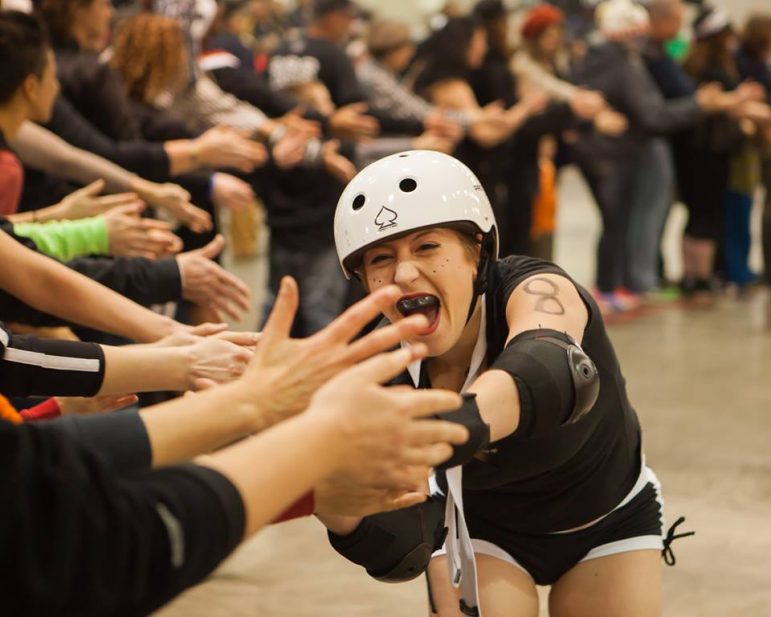Tall and lean, Spam is known for her speed. In a bright green jersey, she whips around an indoor track at the Veterans Memorial Coliseum five nights a year, pushing and weaving her way through a tightly-knit group of women on roller skates.
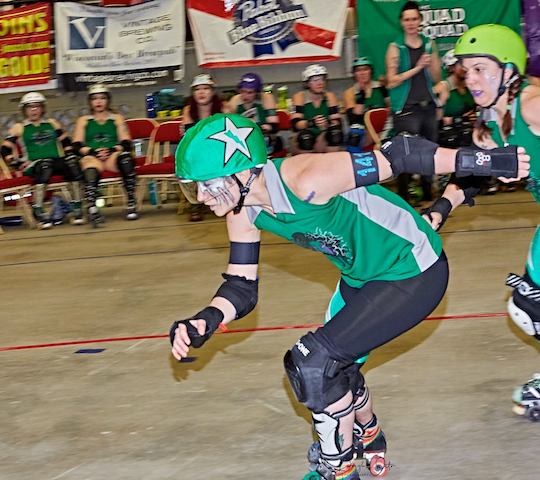
She works tirelessly towards the chance to hold a dismembered mannequin leg, painted gold with a roller skate on its single foot, high in the air at the championship match.
Spam is a member of the Mad Rollin’ Dolls, Madison’s women’s roller derby league. The dismembered leg is affectionately known as Leggy, a championship trophy with a storied history.
Spam, whose given name is Emily Mills, was always athletic but never felt like she fit into other women’s sports. She skated recreationally in the league for a year before being drafted to the Quad Squad, one of the four home teams, where she found an inclusive community of LGBTQ women, and women of all backgrounds, body sizes and experiences.
Women’s roller derby boasts a rebellious reputation. Skaters are known for shunning gender norms and stereotypical femininity. Their loud makeup, colorful hair, raunchy outfits and ceaseless aggression shatters every concept of the traditional woman.
But, derby didn’t originate as a feminist force.
Creating the sport
The term “roller derby” appeared as early as 1922 in reference to endurance races where skaters would circle a track for as long as six days straight in competition for monetary prizes.
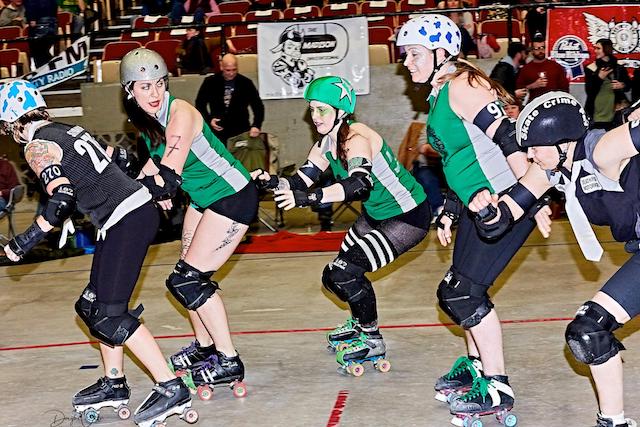
The modern female-dominated sport is rooted in grassroots organization and known for attracting a diverse array of women. The Texas Rollergirls were the first league to form in the United States in 2003, starting the modern roller derby movement in the United States before falling under the rules of the Women’s Flat Track Derby Association (WFTDA) a year later.
Mad Rollin’ Dolls (MRD) was the fourth league to form in the United States under the association, which is the international governing body of modern flat track roller derby.
The Madison league was created by the sister of a Texas Rollergirl, a former skater known as Cracker Jack. Inspired by the spirit and supportive community her sister found in roller derby, Cracker Jack, alongside fellow Madison derby alum Pam Demonium, brought women’s roller derby to Madison.
Creating inclusive spaces
The Madison league’s skaters come from all walks of life. Spam is editor of Our Lives magazine, Madison’s “LGBTQ&XYZ” magazine. Splatter Alice, the league’s executive director, is a public relations and marketing specialist. Other skaters are teachers, artists, tattooists, lawyers, scientists and even a Madison city councilwoman.
Spam knows there’s an underlying personality trait that joins them all together—she just can’t put a name to it, but she thinks it’s someone who wants and thrives on challenge, “whatever that challenge looks like.”
To Spam and her teammates, roller derby created a space for like-minded and marginalized women to come together.
“I think it’s true that we are a community that invented the sport for itself, as opposed to the other way around,” Spam said. “It was largely founded by and for a lot of women who didn’t feel like they belonged in any other sporting community, didn’t feel like they’d ever had a place growing up.”
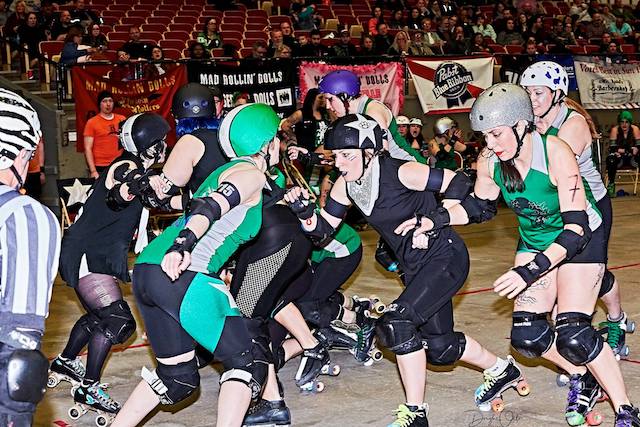
Professor Susan Cahn, a history professor at the University at Buffalo and an expert on gender in sports, calls women’s roller derby a subculture that celebrates women’s athleticism and fosters an independence from major male-governed sports structures.
“It’s interesting in that [roller derby] reverses the usual model, which is that the boys’ and men's [league] exist first and the women then get built in,” Cahn said. “It offers a different kind of model of sports organization that I think is good for people to see.”
Today, the WFTDA has 422 leagues around the world. The Dolls are ranked 31 in the association, making the league the highest-ranked for its market size.
The league boasts four hometown teams, the Quad Squad, the Reservoir Dolls, the Unholy Rollers and the Vaudeville Vixens. It also features an all-star travel team -- the Dairyland Dolls, an interleague team featuring members from all five official teams -- Team Unicorn, and a recreational team -- the Wreckers. The league is a democratic organization completely run voluntarily by the skaters and some community members.
Rules of the game
Roller derby bouts are comprised of 30 minute halves featuring two-minute episodes called jams. Five skaters for each team are on the track at once. The skaters include one jammer, who scores the points, and four blockers, who act both as offense and defense.
Defensively, blockers form a pack in an attempt to prevent the opposing team’s jammer from skating around the track. Offensively, blockers try to push the opposing defense out of the way of their jammer.
Blockers are able to use their torsos, butts, thighs, and upper arms and shoulders to block. Elbows are illegal, and blockers aren’t allowed to deliver a blow to a skater’s back. Blockers serve 30 second penalties for any illegal moves.
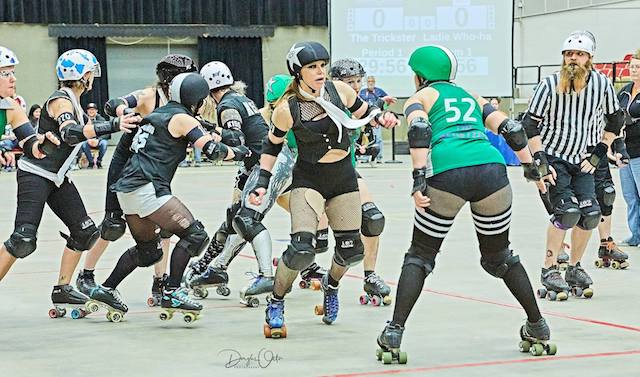
At the start of a jam, the jammers line up behind the pack of blockers on the track. Jammers attempt to get through or around the pack. The first jammer past earns lead jammer status, which allows her to call off the jam when she feels her team’s status is at risk, most often when the opposite jammer is hot on her trail.
Jammers must complete one counterclockwise lap around the track before earning points, which are scored for each opponent jammers pass in following attempts through the pack.
As a jammer, Spam takes hit after hit in every bout, but after six years in the league, she’s grown accustomed to the repeated abuse.
The worst injury she endured was a hairline fracture to her rib the first year she played. She blames the injury on jumping into higher level scrimmage scenarios without first learning proper form.
Skaters wear helmets and protective pads on their knees and elbows. Black eyes, scrapes, bruises and concussions are common injuries, and “stupid, nagging” wounds like broken toes and strained muscles take them off their skates for a few weeks.
Skaters risk more serious injuries, especially tib-fib fractures, where the two bones just above the ankle crack with awkward turns and sudden stops.
The league requires skaters have insurance to play at a contact level. The Dolls provide insurance coverage, which covers “catastrophic” injuries and provides a cushion for players who lack coverage.
“[Derby] encourages physicality, it encourages contact, it doesn’t step away from fear, aggression,” Cahn said. “It sort of celebrates things that are often looked down on, and I think there’s something both actual and symbolically powerful about strong women.”
An opening in sports
Cahn cites two pressures that creates homophobia and accentuates it in mainstream women’s sports. First, the stereotype that female athletes are “manish and lesbian” because of their visible strength, aggression and power, qualities often associated with masculinity. Second, the need to attract advertisers and build a paying audience leads mainstream sports to hire makeup artists and stylists to help their stars appear more feminine.
There have always been LGBT women in sports, Cahn continued. But, what’s different is their ability to be open.
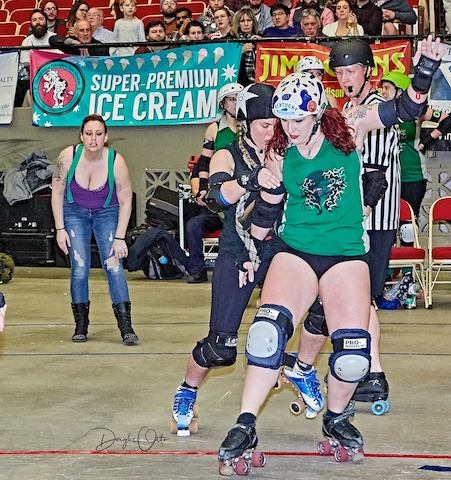
“It’s easier for some people to push back now,” Cahn said. “To the extent that [derby] is kind of part of a counterculture, that frees up women in the sport and teams. It’s a pretty new sport, and it came into being at a time when -- probably more than any other time -- there’s been acceptance of LGBT people and openness.”
The revival of roller derby originated in a women-defined environment, meaning derby girls like Spam control the venue, definition and conditions of the sport, which allows them to challenge the associated gender norms and stereotypes. And, the aggressive and violent sport they redefined had no male counterpart at first.
But, derby girls don’t necessarily forego traditional ideas of femininity; instead, they transform norms into symbols of power and strength.
“Strong women and women’s competitive athletics, and especially team competitions, challenge our comfortable associations that most people still have that identify sports with masculinity and men,” Cahn said. “Roller derby is sometimes contradictory in that it also plays with femininity and people’s names and the way they dress and the personas.”
Derby names are playful, aggressive and raunchy. Critical Tits, Full Frontal Jewdity, Lady Who-Ha, Goldman Smacks and Professor Booty, skaters in MRD, satirize ideas of femininity and sexuality, while other names imply violence and a willingness to take or inflict pain.
“Some people's names are based on their actual name or maybe a childhood nickname,” Spam said. “Most of the time people look for something that’s meaningful to them in some way. It's just something that makes you feel badass or is a reference to something that you love. People choose it for all sorts of reasons, or sometimes it gets chosen for you. It just kind of happens.”
Spam admits that derby isn’t perfect as a whole community, though. Derby is a predominantly white sport, and it’s expensive, which marginalizes women who can’t afford to participate, but the league is establishing a funding program.
Spam acknowledges she’s experienced oppressions for her identities, as well as privileges. Derby helps her to recognize her “own internalized shit” because of the diverse experiences of her fellow skaters, and she notes women in the league are open to being called out for their biases and working to fix the problem.
“It’s really focused on being more inclusive and being more diverse and supporting the people involved and a better body image,” Spam said. “It's not just like the slender, super-fit skaters who are big stars and all that. And we have our issues with you know trying to confront internalized transphobia, homophobia, racism, all of that. All the shit that happens in society happens in derby. The nice thing is that the commitment is to better and to hold ourselves to a higher standard.”
Building community off-track
Derby girls’ commitment to be better extends beyond internal awareness. Their high standards envelope their performance on the track, their physical and emotional well-being and empowering other women. Many undergo a radical metamorphosis from the start of their derby career.
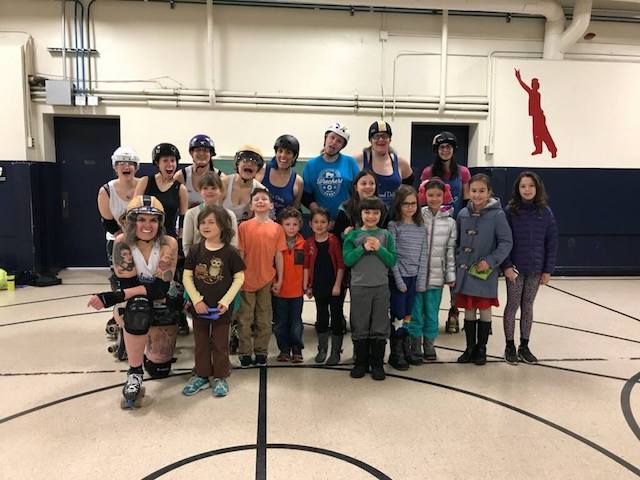
The transformative experience of derby extends beyond health and wellness. Women join the league and make major changes in their lives, too.
“The joke is always like ‘oh, you join derby, you get divorced and you become a lesbian,” Spam laughed. “But that sums up what happens for a lot of people in different ways. It’s something that was in you all along but you finally have a community that you not only see examples of other people doing it, like ‘that’s possible, I can have that life,’ but that’s going to totally support you through the whole process.”
On the track constructive feedback motivates the women to try harder than they think they can. Successes and failures are shared, and skaters view failure as progress “because failure means that you’re trying,” Spam said.
But, the aspect of community and support extends beyond the track. The women empower one another through a supportive network, helping each other move and caring for one another when injured.
“I think that’s what girls sports and women’s sports offer women, even though they’re viewed as sort-of second class or inferior as a sports product,” Cahn said. “I think there’s a kind of intensity and physicality and the amount of time spent together and the emotion all can create a positive female culture.”
Spam reflects on instances where women attempted to leave relationships—whether the situation was abusive and a woman needed help getting out, or the end of a marriage. The women banded together without question, offering childcare and places to stay.
“We’ve thrown divorce parties for people,” Spam said. “Like, clearly this was not a good relationship for you, but now you're in a place where a bunch of tough-ass women who aren’t taking any shit, they’re gonna support you; they’re gonna help you get through this, and you’ve got a community that you can land in. They’re there for you through everything.”
The league further aims to develop a junior league, which coincides with the league’s fundraising and search efforts to rent or buy “a place to hang their skates.”
The junior league would be open to kids of all gender identities from 8 to 18 years old. With young skaters, it’s not about hitting. Kids learn skate skills and play by positioning and simply being in the way. If kids grow up in the league and choose to continue at the adult level, their skills impact the game because they come in with five or six years of knowledge.
“They still have all the cartilage in their knees, and they come into the adult [league] and they’re vastly upping the level of the game at the adult side -- just the level of skill and awareness that comes in at a young age,” Spam said. “I love that I get to see little girls coming up through that and feeling really supported from the start, but its super crucial for little boys, too, to learn non-toxic ideas about how to be a boy and how to play sports and not think that it involves being screamed at or pushed into one thing.”
